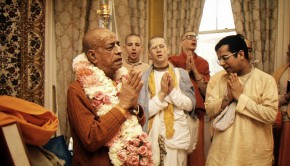Is It Compulsory for a Serious Devotee to Live in a Temple?
I want to know that whether it is compulsory for a person, who is serious in Krishna Consciousness, to become a full time devotee or he can perform his duties being a congregational devotee?
Hari Bol — Srijana
Dear Srijan
Please accept my humble obeisances. All glories to Shree Guru & Gauranga!
I have been requested by Shreeman Madhuvisha Dasa to respond to your inquiry.
Srila Prabhupada himself said that he did not live in a Temple. When asked about devotees not living in the Temple he responded by saying that it doesn’t matter whether one lives in a temple or outside… both must follow all the rules and regulations. According to my understanding of Krishna consciousness, it is a gradual process… It is as gradual as we want to make it.
The basic principle of Krishna consciousness is hearing and chanting. This can be done inside or outside of the Temple, but hearing and chanting is best done in the association of devotees. In the absence of others association, it can be done alone, privately. But hearing and chanting about Krishna must be done every day, as much as possible.
Srila Prabhupada compared living in a temple to a businessman who does much more business at the New York Stock Exchange, rather than hundreds of miles away. He compared ISKCON temples to “the stock of exchange of devotional service.” Lord Chaitanya stressed that association of devotees is paramount in regards to making advancement in Krishna consciousness. Indeed, Srila Prabhupada created ISKCON temples just for that purpose, so that devotees would benefit from each other’s association. One may live outside of the Temple, but one must not live apart from the association of devotees. Srila Prabhupada created the ISKCON Life Membership program and Sunday Feast program especially for those potential devotees, who, due to circumstances, could not live in a Temple. Srila Prabhupada also recognized that in the future, most people would not live in a Temple. Srila Prabhupada envisioned a world in Krishna consciousness. Obviously, the entire world can not live in even all of the ISKCON Temples we already have (almost 400 world-wide). Therefore, Srila Prabhupada said that only 50% of his mission was complete. The other 50% is what he described as “varnashrama” where people, not living in an ISKCON Temple, maintain Krishna consciousness while executing their material duties.
Herein lies the essential answer to your question. Although you may not wish to live in an ISKCON Temple, you have to make your own home a Temple by following all the rules and regulations, as if you were living in a Temple. As I said at the outset, Krishna consciousness is a gradual process. That gradual process is known as yukta-vairagya and also vairagya-vidya.
First we must understand what is the ultimate goal of Krishna consciousness. Once the ultimate goal is understood, everything else falls into place naturally and automatically. The ultimate goal is to feel love of Godhead in every sphere of one’s existential living condition. Love of Godhead is achieved by hearing and chanting without offense. In order to hear and chant offenselessly, one must become detached from material sense gratification. At first one vows to strictly follow the four prohibitions, namely, no eating of meat, fish and eggs, no sex outside of marriage for procreation, no intoxication, including even coffee, tea and cigarettes, what to speak of alcohol and other intoxicants or controlled substances, and no gambling. But this is just the beginning of what is called vairagya or detachment. As one naturally progresses day by day, year by year, one learns to become disinterested in the entire materialistic way of life centered around identification with the body.
There are so many unwanted things we become entangled in simply because of identification with the body. These unwanted things are known as “anarthas”. As one progresses in Krishna consciousness one become more and more keen to root out all unnecessary engagements, attachments, and entanglements which the devotee understands by hearing and chanting are impeding his/her ultimate success in achieving love of God. Finally, one completely surrenders without reservation to Krishna and is then able to taste love of God, the highest possible state of consciousness for the living being.
Hearing and chanting, means hearing and chanting from Srila Prabhupada’s main books, namely Bhagavad-gita, Srimad-Bhagavatam, Nectar of Devotion & Chaitanya-charitamrita.
But one must do all of this in the association of other devotees. So if one does not live in a temple, one must find time to associate with devotees either by visiting the Temple, or attending functions in other’s homes where devotees congregate. Here in Southern California I conduct weekend seminars at different peoples’ homes where this hearing and chanting is done from 2-4 hours. I also do not live in a Temple, but following Srila Prabhupada’s instructions, I make sure that every weekend, I am in the association of devotees.
I hope this answers your inquiry. If you have any further questions, please email me directly.
krishne matir astu
Nirantara dasa















Hari bol…
very nice
Hare Krsna Madhudvisa dasa prabhuji. I want to know is there a problem for you to answer my questions of what is the the ideal temple life and conditions. How are people treated. And the only reason i asked this is because i have known some person who was not cared for and it came to that condition that he was to be hospitalized. As far as i know i don’t feel in a sense i am asking you a wrong question. Otherwise if you don’t want to then please say why and i wll stop waiting and hoping that i will get your reply.
I have absolutely no interest in talking about this bogus ISKCON. You need to get out of ISKCON. Get away from these bogus people completely.
Hare Krishna Prabhu,
I’m reading Bagwadgeetha and I have these two questions in my mind
1) Is it possible for a foetus in the mothers womb to listen and understand Geetha.
2) What was the story of Maharaja Ambarish and Durvasa Muni.
Thank You,
Yes. The child in the mother’s womb can hear and can benefit from hearing Bhagavad-gita. “Understanding” is not required with the transcendental sound. The transcendental sound vibrations are on the spiritual platform and will act if the hearer understand them but they will also act if the hearer does not understand them.
Chant Hare Krishna and be happy!
Madhudvisa dasa
Hare Krishna ,
I have purchased Bagwad Geetha-As it is , and while I read , I’m facing few difficulties to understand .. So whom can I contact in order to clear my doubts.
Hare Krishna Babu
If you have specific questions about the Bhagavad-gita please ask them here and I can answer.
Chant Hare Krishna and be happy!
Madhudvisa dasa
Hare Krishna, Madhuvisa prabu…! I was sent this small 3.5″ x 5.25″ “The Bhagavad-Gita” book, written by a Ramananda Prasad, PhD. It was published and distributed free by the International Gita Society…
Is this small silver book a good read? Its like a miniaturized Gita.
Only Srila Prabhupada’s Bhagavad-gita As It Is is proven to be good. There are so many Gita translations but really it is hard to find any except Bhagavad-gita As It Is which is written by a pure devotee of Krishna. And only a pure devotee of Krishna can understand Krishna. So it is useless reading all these other gitas…
So Get Prabhupada’s Gita and all his other books:
https://krishnastore.com/bhagavad-gita-as-it-is-with-bonus-dvd-h-krishna-407.html
Hare Krishna, Prabhu…yes, I was thinking of getting the Gita at Krishna Store. B4 I do that, do you know what is the size (small, medium, large) of the Japa beads at:
https://krishnastore.com/mantra-meditation-kit-japa-chanting-beads-in-bead-bag-h-krishna-421.html
They are medium size.
Hare Krsna nirantara dasa prabhuji. i have heard from madudvisa dasa that the temples of iskcon are not in accordance with srila Prabhupa’s instructions. and so is it wise to go to temple and associate with devotees who associate with today’s iskcon.